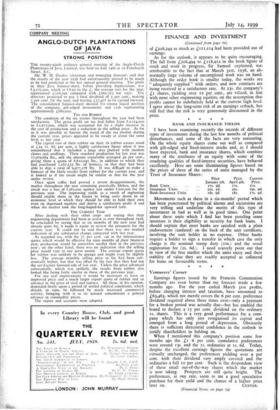COMPANY MEETING
ANGLO-DUTCH PLANTATIONS OF JAVA
STRONG POSITION
THE twenty-ninth ordinary general meeting of the Anglo-Dutch Plantations of Java, Limited, was held on July 14th at 19 Fenchurch Street, E.C. Mr. W. H. Daukes (chairman and managing director) said that the results of the year 1938 had unfortunately proved to be much as he had predicted at the last annual general meeting. The profit in their Java balance-sheet, before providing depreciation, was f.3,173,000, which at f.8.90 to the £, the average rate for the year, represented £356,592 compared with £661,713 for 1937. The directors proposed to pay a final dividend of 3 per cent., making 5 per cent. for the year, and leaving £57,477 to be carried forward. The consolidated balance-sheet showed the strong liquid position of the company, gilt-edged investments and cash representing approximately £68o,000.
TEA AND RUBBER
The condition of the tea estates throughout the year had been satisfactory. The gross profit on tea had. fallen from f.2,114,000 to f.I,675,000, which was accounted for by a slight increase in the cost of production and a reduction in the selling price. As far as it was possible to foresee the trend of the tea market during the current year, prices appeared to be steady at about the same level as last year. The capital cost of their rubber on their 16 rubber estates stood at £i4 7s. 8d. per acre, a highly satisfactory figure when it was remembered that it included a large area planted with modern clones and seedlings. Their standard production for last year was 17,979,684 lbs., and the amount exportable averaged 49 per cent., giving them a quota of 8,810,045 lbs., in addition to which they had purchased 1,167,533 lbs. of licences, so that they had been able to ship a total of 9,977,578 lbs. It was diffiudt to make a forecast of the likely results from rubber for the current year, and it looked as if the result might be similar to that for the year under review.
Once again coffee had proved a severe disappointment, the market throughout the year remaining practically lifeless, and the result was a loss of f.263,00o against just under f.2oo,00o for the previous year. The improving yields as a result of replanting should enable them in the future to bring costs down to an economic level at which they should be able to hold their own even on depressed markets and derive a satisfactory profit if and when the market took the long-hoped-for upward turn.
THE CURRENT YEAR After dealing with their other crops and stating that their engineering department had been as active as ever throughout 1938, he concluded by saying that as six months of the new year had already gone by, it made it easier to review the prospects for the current year. It could not be said that there was any marked indication of any substantial change compared with last year.
As regarded tea, with the 2i per cent. cut in the international quota, which would be effective for nine months pf .their financial year, production would be somewhat smaller than in the previous year ; on the other hand, there was no indication that the selling price would vary to any great extent. The average export quota for rubber was unlikely to be greater and might even be slightly less. The average monthly selling price so far had been sub- stantially higher, but that was offset by the fact that they had not the sat4sfactory forward sale of last year. Unless the price advanced substantially, which was unlikely, the results from rubber also looked like being fairly similar to those of the previous year.
For any real improvement it would be necessary to have an improved price and a much larger export quota of rubber and an advance in the price of sisal and tapioca. All those, in his opinion, depended firstly upon a period of settled political conditions, which should, in turn, be followed by much increased commercial activity, bringing with it as its natural concomitant a general advance in commodity prices.
The report and accounts were adopted.










































 Previous page
Previous page